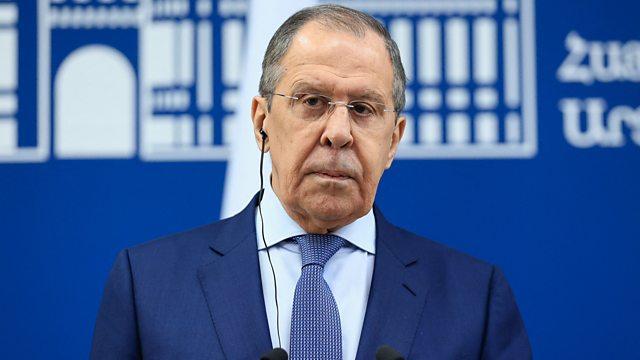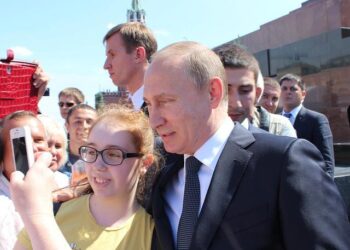Russian Foreign Minister Sergei Lavrov has declared that Moscow is engaged in a “real war” with NATO and Europe, escalating rhetoric amid ongoing geopolitical tensions. Speaking in a recent interview, Lavrov characterized the current state of relations as an intense conflict driven by what he described as Western antagonism toward Russia. This stark statement comes amid continued military confrontations and diplomatic standoffs, underscoring the deepening divide between Russia and the Western alliance.
Russian Foreign Minister Declares Moscow Engaged in Real War with NATO and Europe
Sergey Lavrov has issued a stark warning, framing the geopolitical tensions between Moscow and Western powers as a full-scale, ongoing conflict. Speaking at a recent international forum, he accused NATO and European nations of escalating hostilities through relentless military build-ups and economic sanctions targeting Russia. Lavrov emphasized that this is not just a diplomatic disagreement but a confrontation with profound implications for global stability. He pointed to intensified NATO deployments near Russian borders and continued Western support for Ukraine as evidence of what Moscow perceives as an existential threat.
The Russian foreign minister outlined Moscow’s perspective on the multifaceted nature of this “real war,” which spans:
- Military engagements and proxy battles in Eastern Europe
- Economic warfare through sanctions and trade restrictions
- Information campaigns aimed at shaping international opinion
To underscore the intensity of this confrontation, Lavrov provided a comparative snapshot of defense budgets and troop deployments in the region:
| Entity | Defense Budget (2024) | Troop Deployment Near Borders |
|---|---|---|
| Russia | $90 billion | 120,000+ |
| NATO (Europe) | $300 billion | 180,000+ |
| Ukraine | $16 billion | 250,000+ |
Lavrov’s remarks signal a hardened resolve from Moscow, with an unmistakable message that Russia views the current environment as a survival battle against Western alliance pressures.
Implications of Escalating Tensions for Global Security and Diplomatic Relations
The declaration by the Russian foreign minister that Moscow is engaged in a “real war” with NATO and Europe marks a significant escalation in international rhetoric, underscoring deepening divides that threaten to destabilize longstanding global security architectures. This confrontational stance not only exacerbates mistrust among key geopolitical players but also fuels a cycle of strategic posturing, weapon deployments, and diplomatic isolation that could spiral into unintended conflicts. Analysts warn that continued aggressive narratives may impede dialogue efforts, reduce cooperation on critical issues like arms control, and provoke an arms race across Eastern Europe and beyond.
The ramifications extend beyond military alignments, influencing economic partnerships and international institutions. Countries caught between alliance obligations and economic ties with Russia face increasing pressure, complicating diplomatic relations at multiple levels. Key implications include:
- Heightened risk of proxy conflicts in contested regions as global powers assert influence
- Disruption of energy supplies critical to European economies, impacting global markets
- Weakening of multilateral frameworks such as the United Nations and arms control treaties
| Impact Area | Potential Consequences |
|---|---|
| Military | Increased troop deployments & intelligence activity |
| Economic | Sanctions, trade disruptions, energy price volatility |
| Diplomatic | Fractured alliances, stalled peace talks |
Strategies for De-escalation and Preventing Further Conflict in Eastern Europe
In the volatile landscape of Eastern Europe, diplomatic channels remain paramount to avert a deeper crisis. Open dialogue forums involving Russia, NATO, and EU representatives can help foster mutual understanding and reduce misconceptions fueling the conflict rhetoric. Additionally, confidence-building measures such as military transparency and agreed-upon limitations on troop deployments near contentious borders can provide tangible proof of peaceful intent, tempering aggressive postures from all sides.
Humanitarian initiatives also play a crucial role in preventing further escalation. Cross-border cooperation to ensure the delivery of aid and support for displaced civilians serves not only to alleviate human suffering but also to build trust between conflicting parties. Below is a concise overview of key strategies for de-escalation:
| Strategy | Objective | Implementation |
|---|---|---|
| Diplomatic Summits | Rebuild Negotiation Channels | Bilateral and Multilateral Talks |
| Military Transparency | Reduce Misunderstanding | Information Sharing & Observation |
| Humanitarian Aid | Mitigate Civilian Impact | Joint Relief Operations |
| Conflict Early Warning | Prevent Escalation | Real-Time Monitoring Systems |
Future Outlook
As tensions escalate between Moscow and Western powers, Russian Foreign Minister’s declaration of a “real war” with NATO and Europe underscores the deepening geopolitical rift. The statement signals a hardening stance from Russia amid ongoing conflicts and diplomatic strains, raising concerns about the potential for further instability in the region. Observers will be closely monitoring developments as both sides navigate a fraught and increasingly confrontational landscape.
















